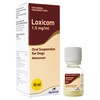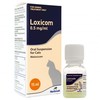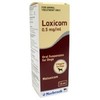Loxicom
Loxicom is a non-steroidal anti-inflammatory drug (NSAID) indicated for the alleviation of inflammation and pain in both acute and chronic musculo-skeletal disorders in cats and dogs. It is commonly associated with treating osteoarthritis, injuries or painful tumours, but can also be used for the alleviation of mild to moderate post-operative pain, and inflammation following surgical procedures.
Loxicom is available as both an oral solution and a chewable tablet for dogs, and as an oral solution for cats.
Loxicom 1.5mg/ml Oral Suspension for Dogs
From:£5.99 to… £39.95Loxicom 1.5mg/ml Oral Suspension is indicated for the alleviation of inflammation and pain in both acute and chronic musculo-skeletal disorders in dogs. Loxicom is a non-steroidal...[More info]
Loxicom 0.5mg/ml Oral Suspension for Cats
From:£8.99 to… £11.33Loxicom 0.5mg/ml Oral Suspension is indicated for the alleviation of inflammation and pain in both acute and chronic musculo-skeletal disorders in cats. Loxicom is a non-steroidal...[More info]
Loxicom 0.5mg/ml Oral Suspension for Small Dogs 15ml
£8.99Loxicom 0.5mg/ml Oral Suspension is indicated for the alleviation of inflammation and pain in both acute and chronic musculo-skeletal disorders in smaller breed dogs. Loxicom is a...[More info]
Contraindications
Do not use in pregnant or lactating animals.
Do not use in animals suffering from gastrointestinal disorders such as irritation and haemorrhage, impaired hepatic, cardiac or renal function and haemorrhagic disorders.
Do not use in case of hypersensitivity to the active substance or to any of the excipients.
Do not use in cats or dogs less than 6 weeks of age.
Special precautions for use in animals
If adverse reactions occur, treatment should be discontinued and the advice of a veterinarian should be sought.
Avoid use in any dehydrated, hypovolaemic or hypotensive animal, as there is a potential risk of renal toxicity.
Special precautions to be taken by the person administering the veterinary medicinal product to animals
People with known hypersensitivity to non-steroidal anti-inflammatory drugs (NSAIDs) should avoid contact with the veterinary medicinal product.
In case of accidental ingestion, seek medical advice immediately and show the package leaflet or the label to the physician.
Adverse reactions (frequency and seriousness)
Typical adverse reactions of NSAIDs such as loss of appetite, vomiting, diarrhoea, faecal occult blood, apathy and renal failure have occasionally been reported. In very rare cases haemorrhagic diarrhoea, haematemesis, gastrointestinal ulceration and elevated liver enzymes have been reported. These adverse reactions occur generally within the first treatment week and are in most cases transient and disappear following termination of the treatment but in very rare cases may be serious or fatal.
If adverse reactions occur, treatment should be discontinued and the advice of a veterinarian should be sought.
The frequency of adverse reactions is defined using the following convention:
•very common (more than 1 in 10 animals treated displaying adverse reactions)
•common (more than 1 but less than 10 animals in 100 animals treated)
•uncommon (more than 1 but less than 10 animals in 1,000 animals treated)
•rare (more than 1 but less than 10 animals in 10,000 animals treated)
•very rare (less than 1 animal in 10,000 animals treated, including isolated reports).
Use during pregnancy, lactation or lay
The safety of the veterinary medicinal product has not been established during pregnancy and lactation
Interaction with other medicinal products and other forms of interaction
Other NSAIDs, diuretics, anticoagulants, aminoglycoside antibiotics and substances with high protein binding may compete for binding and thus lead to toxic effects. Loxicom must not be administered in conjunction with other NSAIDs or glucocorticosteroids.
Pre-treatment with anti-inflammatory substances may result in additional or increased adverse effects and accordingly a treatment-free period with such veterinary medicinal products should be observed for at least 24 hours before commencement of treatment. The treatment-free period, however, should take into account the pharmacokinetic properties of the products used previously.
Amounts to be administered and administration route
Oral use.
To be administered with food or directly into the mouth.
Shake well before use.
Initial treatment is a single dose of 0.2 mg meloxicam/kg bodyweight (i.e. 1.33 ml/10 kg bodyweight) on the first day. Treatment is to be continued once daily by oral administration (at 24 hour intervals) at a maintenance dose of 0.1 mg meloxicam/kg bodyweight (i.e. 0.667 ml/10 kg bodyweight).
For longer term treatment, once clinical response has been observed (after ≥ 4 days), the dose can be adjusted to the lowest effective individual dose reflecting that the degree of pain and inflammation associated with chronic musculo-skeletal disorders may vary over time.
Particular care should be taken with regard to the accuracy of dosing.
The suspension can be given using either of the two measuring syringes provided in the package (depending on weight of dog). The syringes fit onto the bottle and have a kg-bodyweight scale which corresponds to the maintenance dose (i.e. 0.1 mg meloxicam/kg bodyweight). Thus for the first day, twice the maintenance volume will be required. Alternatively therapy may be initiated with Loxicom 5 mg/ml solution for injection.
A clinical response is normally seen within 3-4 days. Treatment should be discontinued after 10 days at the latest if no clinical improvement is apparent.
Avoid introduction of contamination during use.
Overdose (symptoms, emergency procedures, antidotes), if necessary
In the case of overdose, symptomatic treatment should be initiated.


